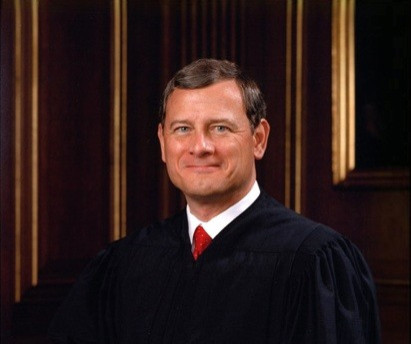John Roberts Flip-Flopped On Health-Care Law Decision: CBS

U.S. Chief Justice John Roberts was originally set to vote with the Supreme Court's conservative justices to strike down the Affordable Care Act, CBS News reported, citing anonymous sources. However, Roberts changed his mind about a month ago to join the court's liberal justices in mostly upholding the constitutionality of the law.
The report -- an apparent scoop despite the fact CBS claimed Roberts' shift is known among law clerks, chambers' aides, and secretaries -- is likely to be politically explosive, as it portrays the conservative justices of the court as heavily political characters, as well as aloof, bickering, and spiteful.
According to CBS, Roberts was set to vote with conservative Justices Samuel Alito, Antonin Scalia, and Clarence Thomas, as well as the so-called swing Justice Anthony Kennedy to strike down the health-care act as an overreach of Congress' power under the Commerce Clause of the U.S. Constitution. But -- possibly because critical media coverage suggested such an outcome would be devastating to the reputation of the Supreme Court, CBS speculated -- Roberts changed his mind.
Roberts pays attention to media coverage. As chief justice, he is keenly aware of his leadership role on the court, and he also is sensitive to how the court is perceived by the public, CBS wrote.
Roberts apparently decided to split the difference, agreeing with the liberals to keep the act more or less intact under a different rationale -- arguing it fell under Congress' power to tax -- but also agreeing with the conservatives that the law exceeded the government's power under the Commerce Clause. That tortuous logic, in the end, was the one that appeared in the majority decision upholding most of the law Thursday.
However, the other four conservative justices certainly made an attempt to keep that from happening, according to CBS, which said Kennedy led the effort to try getting Roberts to switch back to their side.
He was relentless, a source told CBS of Kennedy's efforts. He was very engaged in this.
According to CBS, There was a fair amount of give-and-take with Kennedy and other justices, and it quoted a source who described the politicking as arm-twisting.
Once it was clear Roberts would not budge, the conservatives essentially crossed him off the invitation list for their Fourth of July barbecues.
The conservatives handed him their own message, which, as one justice put it, essentially translated into, 'You're on your own,' CBS wrote. It also noted -- as many pundits have over the past few days -- that the conservatives refused to join any aspect of his opinion, including sections with which they agreed.
Additionally, they refused to cite Roberts' opinion in their dissent, a highly symbolic move that basically was a signal the conservatives no longer wished to engage in debate with him, CBS said.
The CBS article also covered how Roberts attempted to convince his conservative peers to join him, even incorporating language they had used during oral arguments into his decision.
Along the way, the CBS report dispels a rumor that floated around Washington this week that Roberts had written a portion of the dissenting opinion, as well as the majority opinion.
Although this point is not spelled out explicitly, the CBS story implicitly raises questions about the effects Roberts' nuanced decision might have on the future of the court as an institution and even the future of American democracy, as well as about the ornery stubbornness of the conservative justices.
In one example, CBS pointed out the conservative Justice Thomas avoids reading the New York Times, the U.S. newspaper of record, to avoid being influenced by liberals.
© Copyright IBTimes 2024. All rights reserved.




















